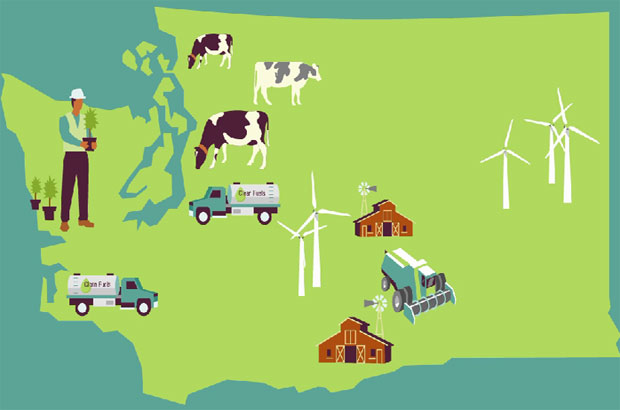Automotivated
An Oregon community college is fueling the future, fostering a new generation of mechanics in cleaner alternatives.

This Climate Solutions program is no longer active.
Sustainable Advanced Fuels accelerates low-carbon alternatives to petroleum-based aviation fuels in the Northwest. By putting a Clean Fuels Standard in place in Washington and Oregon, helping to build a viable advanced fuels market in the Northwest, and supporting international efforts to build a sustainable advanced fuels supply chain, we aim to achieve significant reduction in carbon emissions in the aviation sector.

By: Ross Macfarlane on
New developments in advanced biofuels—and a proposed clean fuels standard—hold great promise for helping cut back our dependence on dirty oil.

By: Jessica Finn Coven on
Elected officials are lining up to support clean fuels in Washington. Add your voice to this surge for consumer choice, job growth and a cleaner environment!

By: Ben Serrurier on
California is saving lives and boosting its economy by capping carbon emissions and supporting clean fuels. Can't we do the same for Washington?

By: Clark Gilman on
At the University of Washington, competing teams of students sought novel solutions to seemingly intractable environmental problems, from reducing packaging waste, to finding new paths for recycling, to creating new renewable energy systems.

By: Clark Gilman on
A new generation of "biorefinery" projects is turning garbage into fuel, and diverting municipal waste from landfills.

By: Clark Gilman on
We are seeing the first commercial-scale cellulosic ethanol plants commissioned in the United States and green diesel is emerging as a key biofuel, potentially a game-changer for sustainable advanced fuels.

By: E. Kirsten Peters on
We can learn from termites--producing biofuels from innovative biorefineries that can break down crop residues and woody materials, doing so economically and in a way that doesn’t harm the environment.

By: Clark Gilman on
Erik Lindbergh’s organization Powering Imagination is now working with innovators in electric flight, biofuels, and noise reduction to influence the future direction of aviation.

By: Chris Bast on
Join a growing coalition of businesses and organizations supporting a clean fuels standard for Washington.

By: Carrie Hearne on
Specifically for the 2014 short session, there was a collective agreement that lifting the 2015 sunset on the Clean Fuels Standard is a key priority, as is protecting the Renewable Portfolio Standard.
Join our email list to learn about what we do and how to get involved.
An Oregon community college is fueling the future, fostering a new generation of mechanics in cleaner alternatives.
New developments in advanced biofuels—and a proposed clean fuels standard—hold great promise for helping cut back our dependence on dirty oil.
Elected officials are lining up to support clean fuels in Washington. Add your voice to this surge for consumer choice, job growth and a cleaner environment!
California is saving lives and boosting its economy by capping carbon emissions and supporting clean fuels. Can't we do the same for Washington?
At the University of Washington, competing teams of students sought novel solutions to seemingly intractable environmental problems, from reducing packaging waste, to finding new paths for recycling, to creating new renewable energy systems.
A new generation of "biorefinery" projects is turning garbage into fuel, and diverting municipal waste from landfills.
We are seeing the first commercial-scale cellulosic ethanol plants commissioned in the United States and green diesel is emerging as a key biofuel, potentially a game-changer for sustainable advanced fuels.
We can learn from termites--producing biofuels from innovative biorefineries that can break down crop residues and woody materials, doing so economically and in a way that doesn’t harm the environment.
Erik Lindbergh’s organization Powering Imagination is now working with innovators in electric flight, biofuels, and noise reduction to influence the future direction of aviation.